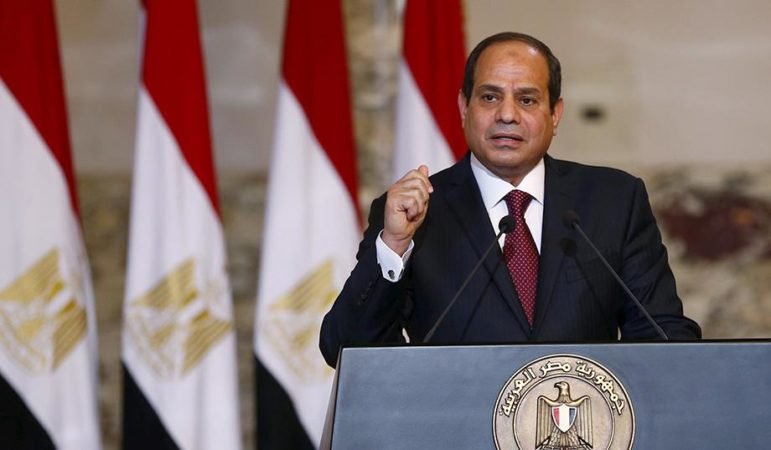Egypt: hopes for democratic future die as al-Sisi marches country towards dictatorship – with parliament’s blessing

During the 2013 coup which ousted Egypt’s elected president Mohammed Morsi, military leader General Abdel Fattah al-Sisi said:
The armed forces have realised that the Egyptian people, who are calling on us to come to their support, are not in fact calling on us to assume power. Rather, they have called on us to perform public service and to secure essential protection of the demands of their revolution.
Six years on, Sisi is still president and the Egyptian parliament is on the verge of endorsing his rule until 2034, losing sight of the revolutionary demands which prompted millions of Egyptians to end the 29-year rule of Hosni Mubarak in January 2011.
Contrary to the hopes of 2011 and 2013, Egypt is sliding even further towards authoritarianism. Tens of thousands of citizens are languishing in overcrowded prisons. Freedom of expression, media independence and opposition movements are curbed in the name of state stability. Torture, unjustified detentions, police assaults and death sentences arethe state’s strategic tools to silence protesters.
A new phenomenon
On February 14, 485 of 596 Egyptian MPs approved sweeping constitutional amendments to allow Sisi’s extension of power. The modifications to the national charter will lengthen the current four-year presidential term to six years, expand the role of the army as a state supervisory body, and give the president the constitutional right to appoint judges and the prosecutor general.
Although the new constitution still limits the president to two terms, Sisi – who was elected for a second term in March 2018 – will be granted a personal exception. The proposed amendments will now be reviewed by the parliament’s legislative and constitutional committee within 60 days before another House of Representatives vote, followed by a national referendum.
“This is totally a new phenomenon,” Ahmed Samih, the director of the Egyptian NGO Andalus Institute for Tolerance and Anti-Violence Studies, told me. “Neither Nasser nor the other presidents who followed him have been able to manipulate the state and the army to such a point as al-Sisi has done in the last five years.” He added:
While Nasser, and in part Sadat [both former Egyptian leaders], addressed public opinion attention toward the fight against Israel, Sisi does not have an external enemy and his struggle is thoroughly focused on repressing the Egyptian people.
Rule through repression
Throughout his time in power, Sisi has endorsed widespread draconian laws. He has trampled on human and civil rights by detaining thousands of activists, journalists, students and political opponents, including the former army chief of staff, Sami Anan. He has curbed the independence of the judiciary by stressing its pivotal role in fighting terrorists, Islamists and any hint of opposition. He has hindered academic autonomy by reintroducing the direct appointment of university heads.
New legal dispositions, such as the anti-protest law (2013), the counter-terrorism law (2015), the NGOs law (2017), and the cybercrime law (2018), have substantially increased the authorities’ power to surveil, repress, silence and detain political opponents. Amendments to the nationality law proposed in 2017 may revoke the Egyptian nationality of citizens living abroad and working with a foreign agency deemed to undermine the social or economic order of the state
Removing the judiciary
Sisi’s power has been further enhanced by the approval of the recent constitutional amendments. A statement signed by at least 11 Egyptian civil society organisations explains:
The amendments eliminate all remnants of judicial independence by immunising exceptional legislation from judicial review while constitutionalising the president’s unilateral authority to appoint judicial leadership … and annul the judiciary’s financial independence.
Through these amendments, the constitutional separation of power will be destroyed, leading to an excessive concentration of authority in the president’s hands. Sisi has proved several times his reluctance to follow constitutional precepts – as in Egypt’s sale of the Tiran and Sanafir islands to Saudi Arabia without calling a popular referendum as required by the constitution.
The recent parliamentary vote crystallised this authoritarianism and repression in Egypt. Far from checking power, legislators gave away their responsibility as a democratic mechanism of the system. Only 16 MPs stood against the modifications.
Among them was Ahmed Tantawy, who emphasised how it dangerously concentrated power in one man’s hands and represented “a setback and a return to what is worse than the pre-25 January [2011] system”. Other opponents, such as Khaled Youssef and Haitham al-Hariri, were subjected to harsh defamatory media campaigns – in both cases, an alleged sexual affair was used as a pretext to whip up a public scandal over “moral indecency”.
Sisi still relies on the support of many Egyptians who see him as the last bastion against the spread of political and economic instability. But, according to Samih, even staunch Sisi supporters are fading away amid the repression and a stagnant economy. Samih said:
Many Egyptian families involved in specific economic sectors, such as fishing, have been kicked out from the business, as the army has now gained an upper hand in their activities.
But the likelihood that disillusionment will lead to Sisi’s departure – or even a check on his ambitions – is slim. Even the military, often seen as the repository of power, is neutered by one of its own. During the past three years, Sisi has implemented a series of reshuffles within the executive and a purge among army generals, buttressing his undisputed authority.
The detention of the former army chief of staff, Sami Anan; the replacement of the once-powerful head of the Egyptian intelligence service, Khaled Fawzi, with a Sisi ally, and the appointment of Sisi’s sons – Mahmoud and Hassan – to key positions within the general intelligence directorate are all clear signs of Sisi’s intention to out-Mubarak Mubarak, transforming his presidency into a full-blown dictatorship.
Scott Lucas is a Professor of International Politics, University of Birmingham
Giovanni Piazzese is a Doctoral Researcher, University of Birmingham
This article first appeared in The Conversation


















